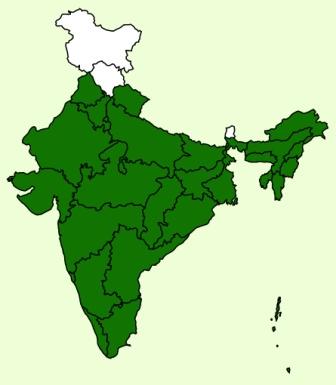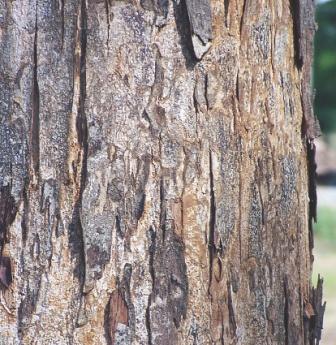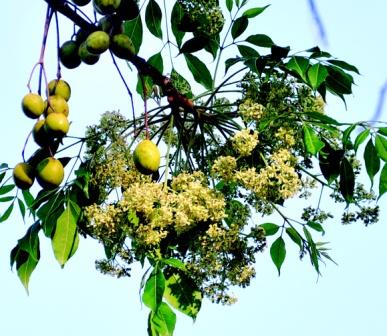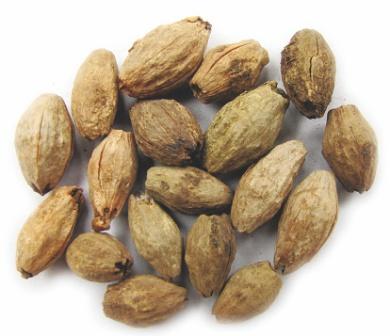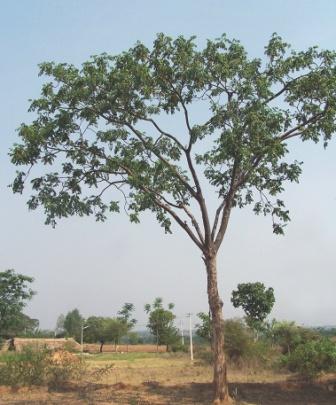Natural Regeneration :
- Natural propagation is mostly through seeds and the germination is very less.
Artificial Regeneration :
- It can be raised either by direct sowing or planting Nursery raised seedlings.
Seed collection and Storage :
- Seeds are collected from ripened fruits (Jan – Feb) by rubbing, washing and drying and stored in sealed tins.
- The drupes should be graded in water to remove floating seeds prior to sowing.
Nursery Technique :
- It is best to sow seeds during March – April.
- Cleaned and dried seeds should be sown in the open raised mother beds.
- Seeds do not germinate in sand.
- They have to be sown in soil: FYM manure medium in the ratio 2:1.
- About 6-7 kg of dried drupes containing about 1500 numbers are required for one standard nursery bed.
- The seeds sown need to be watered regularly, twice a day.
- Germination occurs up to 6 months.
Vegetative Propagation:
- Soft wood cuttings and coppice shoots respond well to 1000 – 2000 ppm IBA (liquid formulation).
- Coppice from older trees responds better to rooting.
- Pencil thick cuttings need to be taken for propagation.
- Thin shoots are easily susceptible to root rot.
- The shoots can be placed on sand medium and watered twice a day.
- A provision for drainage is a must as water logging destroys the shoots.
- Season also plays a major role in the rooting of cuttings.
- Drier seasons are conducive for rooting.
- About 40-50 per cent rooting can be obtained.
(Note: The species is very sensitive to transplantation and hence care must be taken while prickling seedlings from bed or transplanting rooted shoots to bags.)
Plantation technique :
- A spacing of 5 x 5 m is optimal while a spacing of 8 x 8 m for agro forestry purpose.
- Growth is enhanced with the application of fertilizers.
- Regular irrigation is required for fast growth of the trees.
- Initial growth is hastened with daily watering and application of fertilizers once in three months for the first three years.
- Under rain fed conditions, the growth is slow (almost 100 % less).
Care & Disease Control :
· Pruning is necessary to attain clean bole.
· The bole is straight, round, without any knots and without any buttress.
Irrigation :
- Daily watering - Regular irrigation for initial years.
- In case of flood irrigated - alternative days watering for first 2 to 3 weeks after planting, then weekly irrigation to be done Every 10 – 15 days during non rainy season.
Recommended Harvest :
Yield :
- The tree attains a volume of 15 Cu.ft. at the end of 15 years and earns revenue of Rs. 350 per cubic foot from the 5th year onwards.
- It is expected to produce 12 to 15 Cu.ft of timber in 5 years time.
Agro Forestory :
Groundnut, chilli, turmeric, blackgram, papaya, banana, melon, sugarcane , Melia Dubia + Mango , Melia Dubia + Casurina junghuhniana (5 feet distance between the rows).
Major uses :
- The most preferred species for plywood industry.
- The wood is also used for packing cases, ceiling planks, building purposes, agricultural implements, pencils, match boxes, splints, cattamarans, musical instruments and tea boxes
Other uses :
- The leaves repel mosquitoes and other insects.
- A red dye is obtained from the bark.
- The fruits are a source of a flea powder and an insecticide.
Market details :
- Melia fetches Rs. 7300/- per tonne for billets of girth 50-120 cm girth and above
- Rs.370 per CFT (0.02 cu.m.) for trees which have attained a girth > 120 cm.


